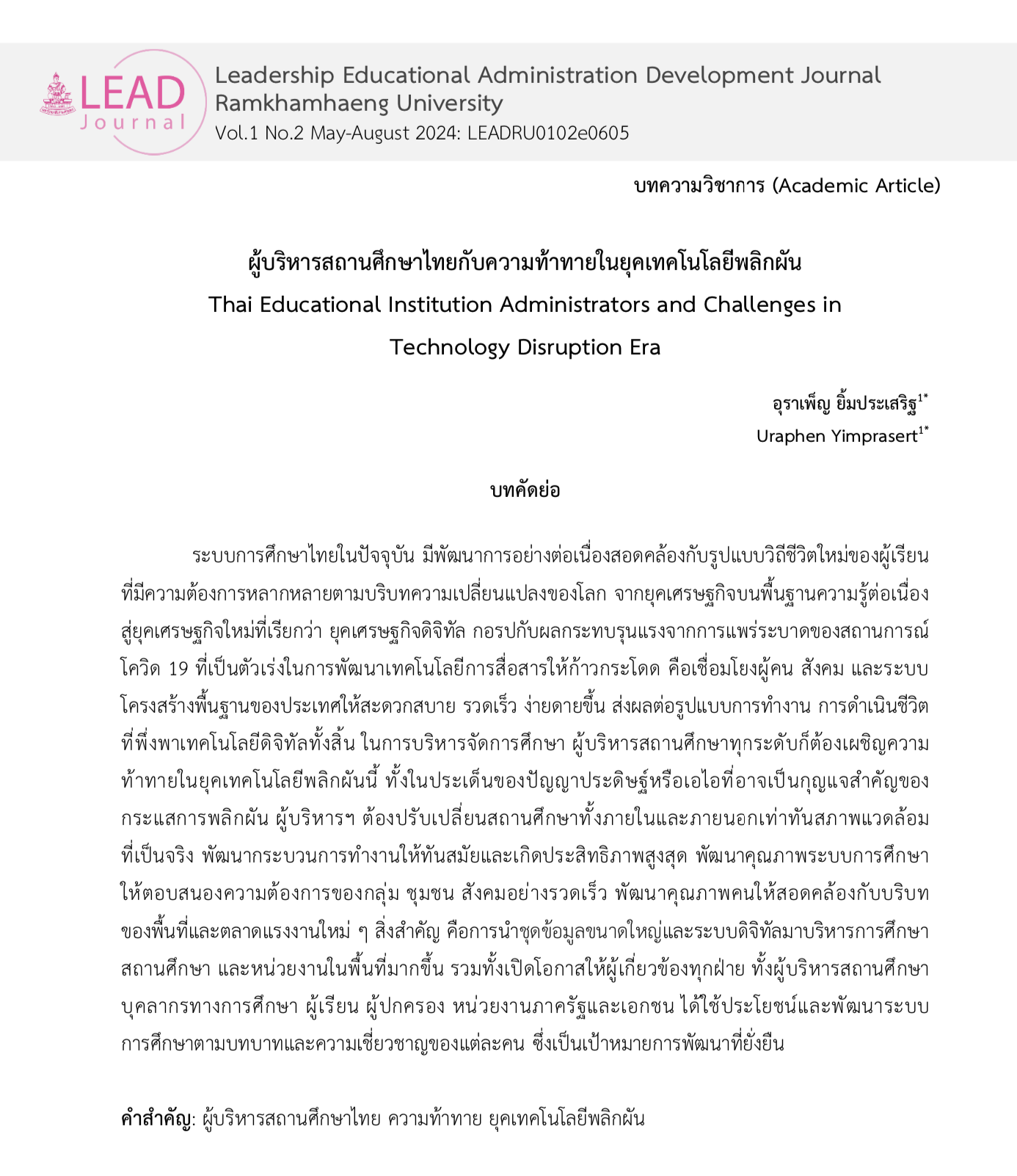Thai Educational Institution Administrators and Challenges in Technology Disruption Era
Main Article Content
Abstract
The current Thai education system has evolved continuously, corresponded to the new normal of learners who have various needs, in line with the context of global changes. Beginning with the Knowledge Economy Age to the new economic era called Digital Economy Age combined with the COVID-19 pandemic, it is a catalyst for the rapid development of communication technology. These connect people, society, and the country infrastructure system to be more convenient, faster, and easier, affecting the working styles. Educational administrators at all levels must confront the challenges of the ongoing technological disruption, particularly in areas such as artificial intelligence (AI), identified as a key driver of disruptive trends. Educational administrators in the 21st century must adjust both internal and external aspects of educational institutions to align with the current environment. This involves modernizing and optimizing workflows, rapidly developing education systems to meet the diverse needs of communities, and enhancing the quality of individuals to match the context of their area-based context and labor markets. The important concept is to use big data sets and digital systems for educational managements, educational institutions, and more local agencies, including offering opportunities for all stakeholders such as educational institution administrators’ educational personnel, learners, parents, public and private sectors. They all can benefit and develop the education system according to their individual roles and expertise, which is a sustainable development goal.
Downloads
Article Details

This work is licensed under a Creative Commons Attribution-NonCommercial-NoDerivatives 4.0 International License.
แนวคิดและข้อเสนอแนะที่นำเสนอในบทความของวารสารการบริหารและความเป็นผู้นำทางการศึกษา มหาวิทยาลัยรามคำแหง เป็นแนวคิดที่มาจากผู้เขียน หากมีความผิดพลาดใด ๆ ผู้เขียนเป็นผู้รับผิดชอบแต่เพียงผู้เดียว
ทั้งนี้ บรรณาธิการ กองบรรณาธิการ และคณะกรรมการหน่วยจัดทำวารสารฯ จะไม่ก้าวก่ายความมั่นคงในหลักการตามความคิดของผู้เขียน
ดังนั้น บรรณาธิการ กองบรรณาธิการ คณะกรรมการหน่วยจัดทำวารสาร และมหาวิทยาลัย จะไม่รับผิดชอบใด ๆ จากผลที่เกิดขึ้นจากการนำเสนอแนวคิด และข้อเสนอแนะของผู้แต่งที่เผยแพร่ในวารสารฯ
References
Bussaratis, T. (2016). Influence of CRM Message Communication via Chatbot on Customer Engagement Level. (Master of Independent Study, Thammasat University). [In Thai].
Chaemchoy, S. (1999). Technology Leadership: Leading Technology into 21st Century School, Journal of Education Naresuan University, 16(4), 216–224. [In Thai].
Chantacho, S., (2023). The Roles of School Administrators in the Volatility Uncertainty, Complexity and Anxiety World (VUCA) Affecting the Application of Digital Technology for Teaching and Learning in Schools under Trat Primary Educational Service Area Office. (Master Thesis, Rambhai Barni Rajabhat University). [In Thai].
Klangjai, S. (2024). AI and Education in the Future: 2030. Retrieved from https://klangjai.medium.com/ai-กับการศึกษา-2023-965000c4c250. [In Thai].
Keesukphan, E. (2016). School Management in Digital Era. Retrieved from https://www.trueplookpanya.com/education/content/52232. [In Thai].
Khumsamart, S., Kuljittree, S. and Juntapala, K. (2020). The Guidelines for Educational Administration in the Digital Distribution Era. Journal of Modern Learning Development, 5(3), 245-259. [In Thai].
Mitchell, T. M. (2006). The Discipline of Machine Learning. Retrieved from https://www.cs.cmu.edu/afs/cs/usr/mitchell/ftp/pubs/MachineLearningTR.pdf.
Mrazek, P. (2022). Administration of Educational Organization in Digital Era. (Master Thesis, Burapha University). [In Thai].
Osadhapiruk, S., Jenkwao, S., Deekawong, S. and Thaweesinthisut, C. (2024). Learning Management in the Digital Disruption Era. Bangkok: Pacific Institute of Management Science. [In Thai].
Pahay, S. (2022). Ubiquitous Education: Anywhere and Anytime. Phrae: Phrae Thai Publishing Industry. [In Thai].
Phongphattharakarn, P. (2024). AI is the Future, but Education is the Upstream. Retrieved from https://www.eef.or.th/article-342124/. [In Thai].
Sinthuphan, L., Chewpimai, D., Hiepkaew, T., Phonyiam, K., Wongchaisiri, P., Riwphongkul, P., Faktang I. and Rattansuwan, K., (2023). Lesson Learned from the Training Process for Increasing Academic Services Competency in the Digital Disruption Era of Academic Services Department, Office of Academic Services, Khon Kaen University. Journal of Office of Academic Service for Society (JOASS), 2(1), 1-14. [In Thai].
Siriwan, N. (2024). Improving the Administration Quality of Public Sector: A Case Study of an Organization that Received the Government Administration Quality Award, Category 3, Focusing on Service Recipients and Stakeholders. Bangkok: National Assembly Library of Thailand. [In Thai].
Sullivan, L. (2017). 8 Skills Every Digital Leader Needs. Retrieved from https://www.cmswire.com/digital-workplace/8-skills-every-digital-leader-needs/.
Thotsata, O. (2021). Transformational Leadership of Educational Institution Administrators Affects the Learning Organization of Educational Institutions. Academic journal of North Bangkok University. 10(2), 188–199. [In Thai].
Vicheanpant, T. (2024). Comparison of Results 18 Methods of Active Learning Conduct to Analyze Learning Style of the Learners in Higher Education based on Kolb's Model. Chonburi: Office of Research and Innovation Development. [In Thai].
Wanasri, J. (2022). Educational Administration in the Digital Age, 1st ed. Phitsanulok: Rattana Suwan Publishing. [In Thai].
Wess, S. (2017). Robots will take over Human Jobs: A Future Look at Artificial Intelligence with Dr.Stefan Wess, the Momentum. Retrieved from https://themomentum.co/successful-innovation-design-cu2016-artificial-intelligence.


